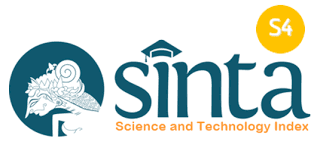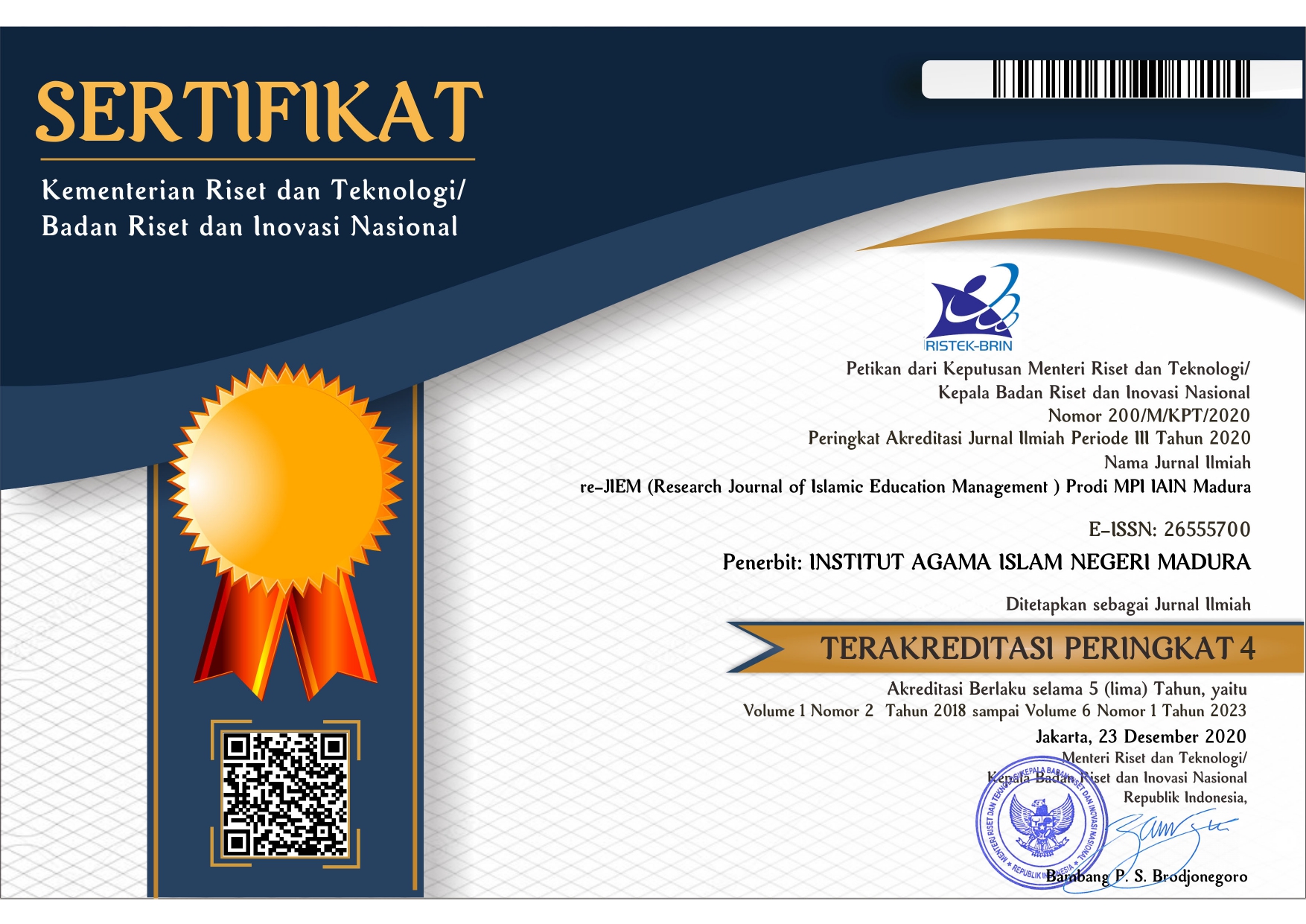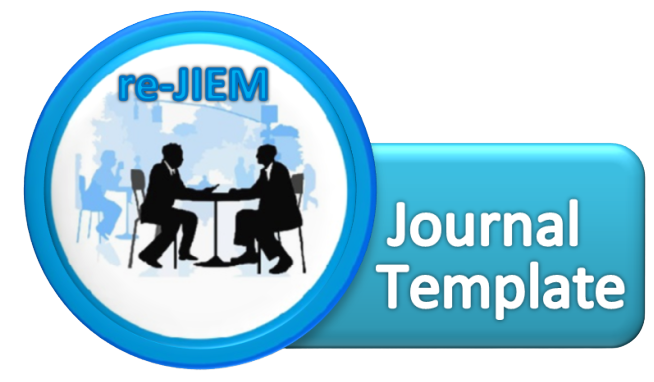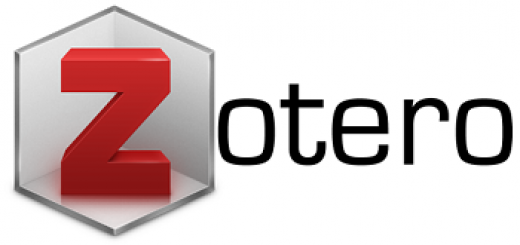IMPLEMENTASI MANAJEMEN KURIKULUM PESANTREN DALAM MEMBENTUK KARAKTER MANDIRI SANTRI DI PONDOK PESANTREN NURUS SIBYAN AMBAT TLANAKAN PAMEKASAN
 Abstract views: 691
,
Abstract views: 691
,
 PDF downloads: 551
PDF downloads: 551
Abstract
Independent character is something that must be formed and developed in educating. This research is about the implementation of pesantren curriculum management in forming the independent character of santri in the Nurus Shibyan Ambat Tlanakan Pamekasan Islamic Boarding School by using a qualitative approach with descriptive types through interviews, observation and documentation. The results of the study show that: First the management of the pesantren curriculum in shaping the character of the santris' independence is using planning, organizing and evaluating. Secondly, the formation of the independence character in the Nurus Shibyan Islamic boarding school is more for coaching, namely through fostering exemplary, fostering advice or encouragement. Third, supporting factors in forming the independence of santries are team cohesiveness, teacher involvement in forming the character of independence, and santri motivation in training or activities. The inhibiting factors are minimal facilities and infrastructure of Islamic boarding schools, financing factors, and the behavior of santries who are sometimes undisciplined.
Downloads
References
A. Steenbrink, Karel. Pesantren, Madrasah, Sekolah. Jakarta : LP3ES, 1986.
Arifin, Imron. Kepemimpinan Kyai, Kasus Pondok Pesantren Tebuireng. Malang: Kalimasahada Press, 1995.
Dhofier, Zamakhsyari. Tradisi Pesantren: Studi Pandangan Hidup Kyai dan Visinya Mengenai Masa Depan Indonesia. Jakarta: LP3ES, 2011.
Efendi, Nur. Manajemen Perubahan di Pondok Pesantren. Yogyakarta: Teras 2014.
Geertz, Clofford. Abangan, Santri, Kiyai dalam Masyarakat Jawa. Jakarta: Pustaka Jaya,1981.
Haedari, Amin, dan El Saha, Ishom. Peningkatan Mutu Terpadu Pesantren dan Madrasah Diniyah. Jakarta: Diva Pustaka, 2006.
Mahfudh, M.Sahal. Pesantren Mencari Makna. Jakarta: Pustaka Ciganjur, 1999.
Mansur, Moralitas Pesantren; Meneguk Kearifan dari Telaga Kehidupan. Yogyakarta: Safiria Insania Press, 2004.
Mastuhu. Dinamika Pendidikan Pesantren; Suatu Kajian Tentang Unsur Nilai Sistem Pendidikan Pesantren. Jakarta: INIS, 1994.
Masyhud, M. Sulthon, dan Moh. Khusnuridlo. Manajemen Pondok Pesantren. Jakarta: Diva Pustaka, 2003.
Minarti, Sri. Manajemen Sekolah Mengelola Lembaga Pendidikan Secara Mandiri. Yogyakarta: Ar Ruzz Media, 2017.
Moleong, Lexy J. Metodologi Penelitian Kualitatif. Bandung: Remaja Rosdakarya, 2014.
Mubah, Hilmi Qosim. Manajemen Pesantren dan Pendidikan Luar Sekolah. Pamekasan: iainmadura press, 2019.
Oepen, Manfred dan Wolfgang Karcher. Dinamika Pesantren : Dampak Pesantren dalam Pendidikan dan Pengembangan Masyarakat. Jakarta : P3m-FNS, 1987.
Saifuddin, Ahmad. “Eksistensi Kurikulum Pesantren dan Kebijakan Pendidikan.” Jurnal Pendidikan Agama Islam III, no. 01 (2015).
Sanusi, Uci. “Pendidikan Kemandirian di Pondok Pesantren Study Mengenai Realitas Kemandirian Santri di Pondok Pesantren Al Istiqlal Cianjur dan Pondok Pesantren Bahrul Ulum Tasikmalaya.” Jurnal Pendidikan Agama Islam X, no. 2 (2012).
Solichin, Muchlis, Moh. Hafidz, dan Hilmi Qosim Mubah. “Kualitas Program Persiapan Guru Tugas Di Pondok Pesantren Mambaul Ulum Bata-Bata Panaan Palengaan Pamekasan.” re-JIEM (Research Journal of Islamic Education Management) 2, no. 2 (2019): 305. https://doi.org/10.19105/re-jiem.v2i2.2870.
Sulthon Masyhud. Manajemen Pondok Pesantren. Jakarta: Diva Pustaka, 2003.
Thohir, Kholis. “Kurikulum dan Sistem Pembelajaran Pondok Pesantren Salafi di Kecamatan Kresek Kabupaten Tangerang Provinsi Banten.” Jurnal Analyicticaa Islamica 06, no. 01 (2017).
Undang-Undang Nomor 20 Tahun 2003 Tentang Sistem Pendidikan Nasional. No Title, 2003.
Authors who publish with this journal agree to the following terms:
Authors retain copyright and grant the journal right of first publication with the work simultaneously licensed under a Creative Commons Attribution-ShareAlike 4.0 International License that allows others to copy and redistribute the material in any medium or format with an acknowledgment of the work's authorship and initial publication in this journal and also allows to remix, transform, and build upon the material for any purpose, even commercially with contributions under the same license as the original.
Authors are able to enter into separate, additional contractual arrangements for the non-exclusive distribution of the journal's published version of the work (e.g., post it to an institutional repository or publish it in a book), with an acknowledgment of its initial publication in this journal.
Authors are permitted and encouraged to post their work online (e.g., in institutional repositories or on their website) prior to and during the submission process, as it can lead to productive exchanges, as well as earlier and greater citation of published work.



























